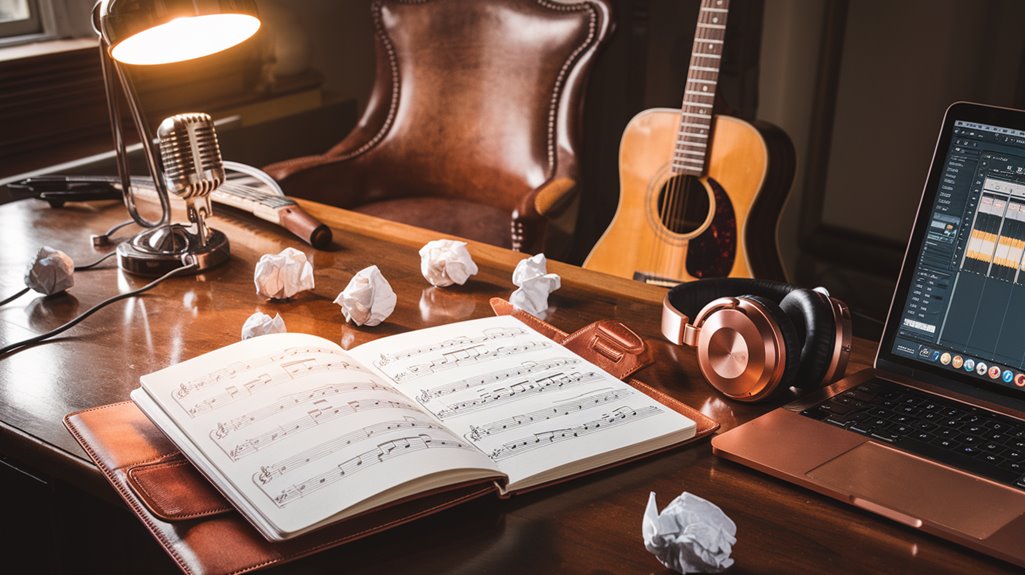If you've ever dreamed of hearing your songs on the radio or streaming platforms, you'll need more than just raw talent to make it as a famous songwriter. While natural ability certainly helps, the path to songwriting success requires a strategic blend of creative mastery, industry knowledge, and professional connections. From understanding song structure to protecting your intellectual property, there's a complex web of skills you'll need to develop. Let's explore the essential steps that can transform your musical passion into a renowned songwriting career.
Key Takeaways
- Master fundamental songwriting skills including song structure, chord progressions, and lyric writing while developing a unique artistic voice.
- Build a professional recording setup and learn digital audio workstations (DAWs) to create high-quality demos of your songs.
- Network actively within the music industry by attending conferences, joining professional organizations, and collaborating with other artists.
- Protect your work through proper copyright registration and join performing rights organizations to secure royalty payments.
- Maintain a strong online presence through social media platforms and music sharing sites to showcase your work and engage audiences.
Master the Songwriting Basics
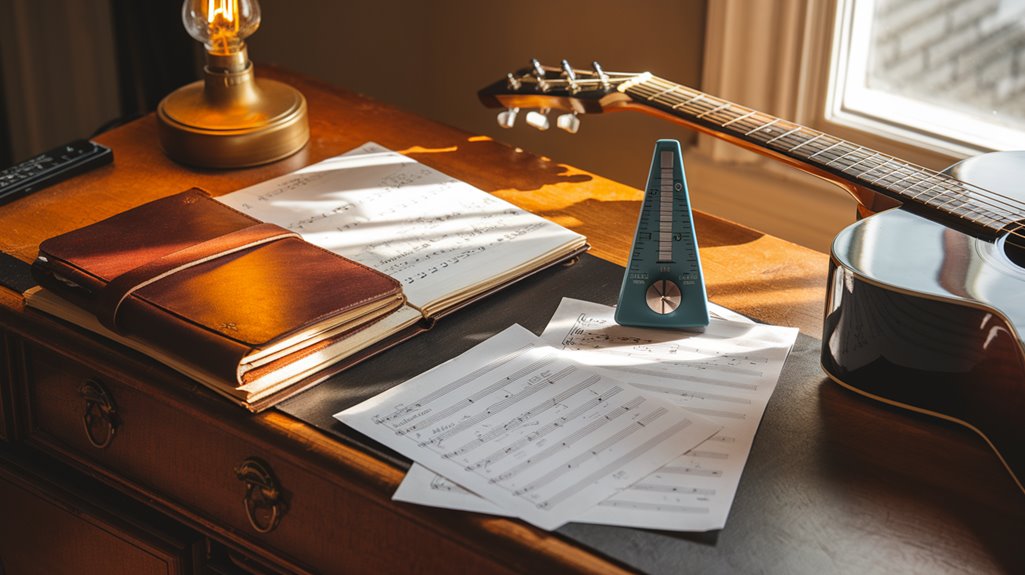
The foundation of every hit song lies in mastering the fundamental elements of songwriting. To become a successful songwriter, you'll need to immerse yourself in understanding the building blocks that create chart-topping hits and timeless classics.
Start by studying song structure, which serves as your roadmap to crafting memorable music. You'll want to master the interplay between verses, choruses, and bridges, understanding how each section contributes to your song's emotional journey. Pay close attention to how successful songs use these elements to build tension and release, creating compelling narratives that keep listeners engaged.
Next, focus on developing your melodic and harmonic skills. Learn the power of common chord progressions like I-IV-V and vi-IV-I-V, which you'll find at the heart of countless hits. These progressions aren't just theory – they're tools that can help you create hooks that stick in listeners' minds long after the song ends.
Your lyrics need to paint vivid pictures and tell stories that resonate. Work on crafting memorable rhyme schemes and imagery that connect with your audience on an emotional level. Don't just tell them how you feel – show them through carefully chosen words and metaphors.
Make it a habit to analyze hit songs in your preferred genre. Break them down to understand their musical elements, chord structures, and emotional triggers. This analysis will help you develop your unique style while staying commercially viable. Remember, the best songwriters aren't just artists – they're skilled craftspeople who understand their tools inside and out.
Build Your Creative Toolkit
Successful songwriting demands more than raw talent – it requires a well-equipped creative arsenal that you'll need to build systematically. Today's hitmakers combine traditional songwriting techniques with cutting-edge tools to craft songs that resonate with millions of listeners.
Start by mastering fundamental chord progressions like I-IV-V and vi-IV-I-V. These timeless patterns appear in countless hits across genres, and they'll give your songs a solid foundation that connects with audiences. Don't just memorize them – experiment with variations to develop your unique style.
Digital audio workstations are essential in modern songwriting. Whether you choose Ableton Live, Logic Pro, or another DAW, these powerful tools let you capture inspiration instantly and refine your ideas into polished compositions. You'll discover new melodic possibilities as you layer tracks and manipulate sounds.
Keep your creative flow alive by maintaining a songwriting journal. Jot down lyrics, melody ideas, and concepts whenever inspiration strikes. This personal collection becomes an invaluable resource when you're crafting new material or facing writer's block.
Don't limit yourself to solo creation. Collaborate with fellow musicians and songwriters to spark fresh ideas and learn new approaches. Their perspectives can transform your writing process and help you break through creative barriers.
Finally, harness the power of digital tools designed specifically for songwriters. Apps like RhymeZone can reveal lyrical possibilities, while Hooktheory helps you understand melody construction. These resources can elevate your writing when inspiration needs a boost.
Study Musical Theory
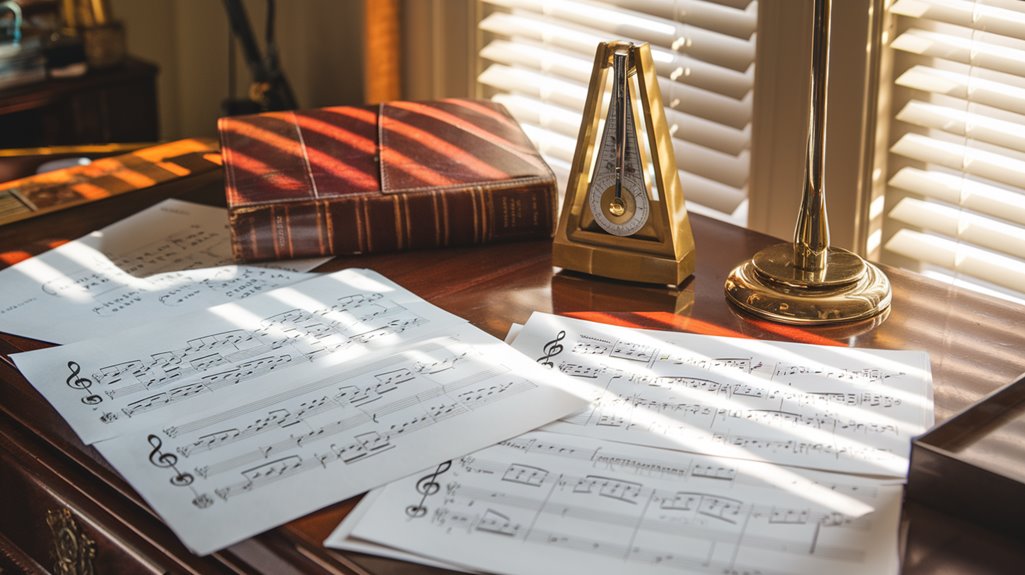
While raw talent might ignite your songwriting journey, mastering musical theory will transform your creative sparks into blazing hits. You'll discover that understanding scales isn't just about memorizing notes – it's about revealing the DNA of melody creation. When you grasp the power of major and minor scales, you'll craft emotional journeys that resonate with listeners on a deeper level.
Don't let the mathematics of rhythm intimidate you. While 4/4 time dominates today's charts, exploring different time signatures can set your songs apart. You'll learn to weave rhythmic patterns that make bodies move and hearts beat faster. Master these fundamentals, and you'll write hooks that stick in people's minds long after the music stops.
Your songs will take on new life when you harness the emotional potential of key signatures. Whether you're aiming for uplifting major keys or soul-stirring minor progressions, you'll paint with a broader palette of musical colors. Learn to modulate between keys, and you'll create dynamic shifts that keep listeners engaged.
Study hit songs like a detective examining evidence. Break down their chord progressions, analyze their structures, and understand why certain combinations work magic on audiences. Pay special attention to dynamics and articulation – these subtle elements can turn a good song into an unforgettable one. They're your secret weapons for conveying raw emotion, whether you're writing a whispered ballad or an anthemic chorus that demands to be sung at full volume.
Network With Industry Professionals
If you're serious about making it as a famous songwriter, you'll need to build authentic relationships with industry professionals who can champion your work and open doors to new opportunities. You can jumpstart your networking by attending high-profile music conferences, workshops, and festivals where decision-makers gather to discover fresh talent and forge meaningful connections. Joining professional organizations and maintaining an active presence on industry-focused social platforms will help you create lasting partnerships that can transform your songwriting career.
Build Genuine Industry Connections
Building genuine industry connections requires more than just collecting business cards or adding contacts on social media – it's about cultivating meaningful relationships that can transform your songwriting career. The key is to be authentically engaged and consistently present in the music community.
Start by immersing yourself in the industry's ecosystem. Attend music conferences, workshops, and showcases where you'll meet fellow songwriters and producers who share your passion. These events often spark collaborative opportunities that can elevate your craft and expand your network. Don't forget to leverage social media platforms strategically – engage meaningfully with established songwriters and industry professionals by sharing thoughtful comments and your unique perspective.
Join local songwriting groups or online communities where you can exchange ideas and feedback. These spaces often lead to organic collaborations and lasting professional relationships. Consider gaining hands-on experience through internships or volunteer positions at music venues and festivals – they're goldmines for making direct connections with industry insiders. Meanwhile, develop your personal brand by consistently sharing your musical journey online. When you're genuine and generous with your talent, you'll naturally attract the right people who can help advance your songwriting career.
Attend Music Industry Events
As the music industry thrives on face-to-face connections, attending industry events can catapult your songwriting career to new heights. Whether you're stepping into a bustling conference hall or an intimate workshop setting, these gatherings serve as launching pads for meaningful professional relationships that could transform your career trajectory.
Make the most of every event by actively participating in panel discussions and industry talks. You'll gain invaluable insights into current music trends and production techniques while positioning yourself as an engaged member of the songwriting community. Don't miss out on pitch sessions – these golden opportunities let you showcase your work directly to decision-makers who could champion your music.
Remember to polish your online presence before attending these events. When you exchange contact information with industry professionals, they'll likely explore your digital footprint. Maintain an impressive social media presence that reflects your songwriting brand and achievements. Your online identity should reinforce the positive impression you make in person.
Always approach networking with authenticity and preparedness. Bring business cards, rehearse your elevator pitch, and be ready to discuss your latest projects with confidence and passion.
Join Professional Music Organizations
Professional music organizations serve as gateways to invaluable connections and career-defining opportunities in the songwriting world. By joining prestigious groups like the Songwriters Guild of America or ASCAP, you'll position yourself within arm's reach of industry veterans who can help shape your career trajectory. These organizations don't just offer membership cards – they provide golden tickets to exclusive events, workshops, and mentorship programs that can transform your songwriting journey.
Take advantage of the rich resources these organizations offer. You'll gain access to industry-specific seminars that decode current trends and reveal insider strategies for success. Through organized showcases and networking sessions, you'll meet producers, publishers, and fellow songwriters who might become your next collaborators or champions. These connections often lead to licensing deals and performance opportunities that could catapult your work into the spotlight.
Don't underestimate the power of professional credibility these memberships bring. When you're affiliated with respected music organizations, you're not just another aspiring songwriter – you're part of a recognized community of professionals actively shaping the industry's future. Your membership demonstrates your commitment to craft and your readiness for serious consideration in the music business.
Protect Your Musical Rights
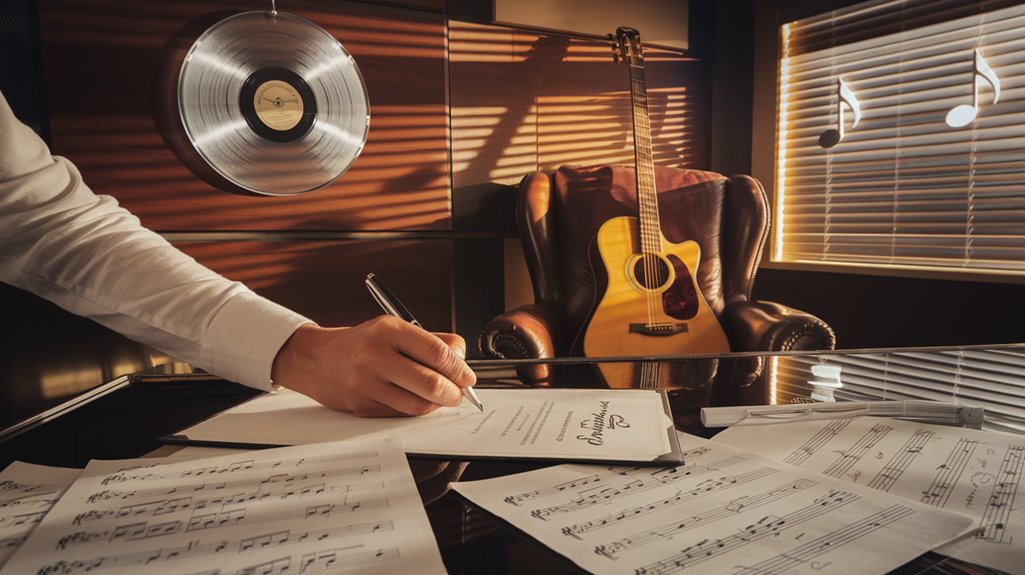
You'll need to safeguard your creative works by registering your songs with the U.S. Copyright Office before sharing them with the world. Setting up accounts with performing rights organizations like ASCAP or BMI guarantees you'll receive royalties whenever your music plays on radio, TV, or in public venues. Your musical future depends on protecting your rights from day one, so take these essential steps before your songs hit the mainstream.
Register Your Copyright Early
One of the most essential steps in protecting your songwriting career is registering your copyright with the U.S. Copyright Office. By taking this vital action early, you're establishing a clear legal record of your ownership and creative rights, which becomes invaluable as your career grows.
Don't wait until your song becomes a hit to protect it. Register your copyright within three months of releasing your work to secure maximum legal protection. This timing is critical because it allows you to claim statutory damages and attorney fees if someone infringes on your rights, potentially saving you thousands in legal costs down the road.
For just $45 per work, you're investing in your future and demonstrating to industry professionals that you take your craft seriously. In today's competitive music landscape, having registered copyrights shows you're not just another amateur – you're a professional who understands the business side of music. Think of copyright registration as your song's birth certificate; it's official documentation that proves you're the rightful creator. When record labels, publishers, or other artists want to work with your music, they'll appreciate dealing with someone who has their legal affairs in order.
Music Royalty Collection Setup
Setting up your royalty collection system is as essential as writing hit songs, because without it, your music could generate thousands of dollars that you'll never see. Your first step should be joining a Performance Rights Organization (PRO) like ASCAP, BMI, or SESAC. These organizations are your frontline warriors, tracking and collecting royalties whenever your songs play on radio, TV, or in public venues.
Don't stop there – you'll need multiple channels to capture every penny your music earns. Partner with a music publishing company or establish your own publishing entity to secure mechanical and synchronization royalties. The Harry Fox Agency can be your ally in collecting royalties from physical album sales and digital downloads. For independent distribution, platforms like TuneCore and CD Baby offer extensive services that guarantee you're paid when your music streams or sells.
Document everything meticulously – it's your musical legacy at stake. Keep detailed records of song registrations, performances, and licensing agreements. Think of your royalty setup as building a solid foundation for your songwriting empire. When success hits, you'll want every stream, play, and download to contribute to your bank account.
Collaborate With Other Artists
While writing songs alone can produce great results, collaborating with other artists is often the secret ingredient that transforms good songs into unforgettable hits. Just look at today's chart-toppers like Ed Sheeran and Taylor Swift, who've consistently credited their collaborative efforts as the driving force behind their biggest successes.
When you join forces with other songwriters, you'll discover fresh perspectives and techniques that'll elevate your craft. Each co-writer brings their unique flavor to the table, introducing you to new melodic patterns, lyrical approaches, and creative solutions you might never have explored on your own. These sessions can be particularly valuable when you're facing writer's block – sometimes all it takes is another creative mind to help you break through those creative barriers.
The magic of collaboration extends beyond just the songwriting process. You'll build valuable connections within the industry, opening doors to future opportunities and performances. Each collaboration adds another layer to your professional network, potentially leading to more co-writing sessions, performance opportunities, and industry exposure.
Most importantly, collaboration helps refine your work to its highest potential. When multiple talented minds focus on a single song, they can identify both its strengths and weaknesses more effectively. This collective expertise often results in more polished, radio-ready tracks that resonate with wider audiences. Don't underestimate the power of creative synergy – some of music's most iconic songs were born from collaborative efforts that pushed boundaries and challenged conventional songwriting approaches.
Share Your Work Online
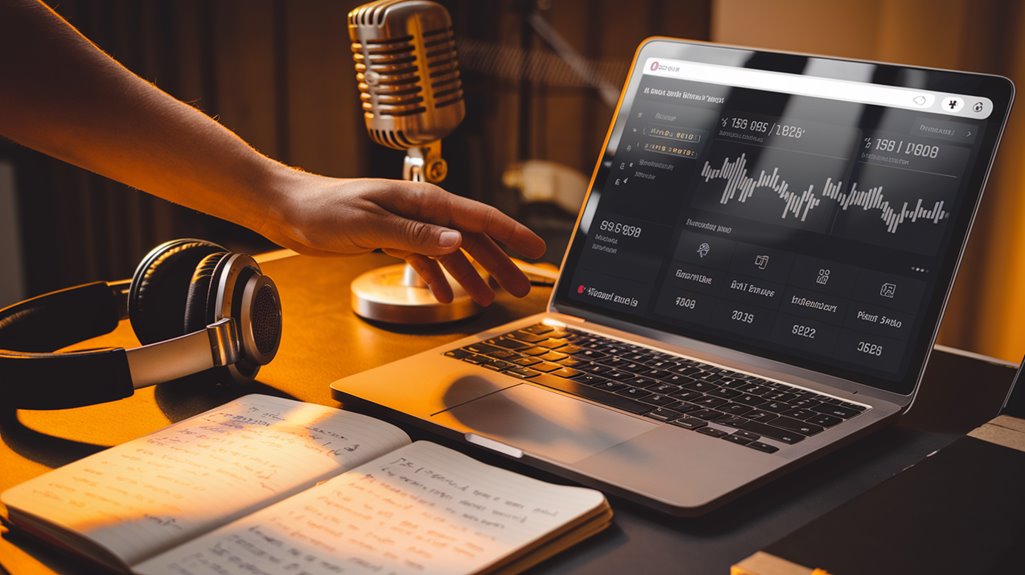
Beyond in-person collaborations, the digital landscape offers boundless opportunities to showcase your songwriting talent. Today's interconnected world means your next hit song could reach millions of listeners with just a few clicks, making it essential to establish a strong online presence across multiple platforms.
Start by creating accounts on major music-sharing platforms like SoundCloud, YouTube, and Bandcamp. These platforms serve as your digital portfolio, allowing you to build a dedicated following while demonstrating your versatility as a songwriter. Don't forget to optimize your profile with professional photos, compelling bios, and consistent branding across all platforms.
Social media platforms have become powerful tools for songwriters to gain recognition. Share behind-the-scenes glimpses of your creative process on Instagram, or jump on trending sounds on TikTok to showcase your songwriting abilities. These platforms can turn a single catchy hook into a viral sensation overnight.
Take your online presence further by developing a personal website or blog where you can share your journey, songwriting tips, and exclusive content. This helps establish your authority in the industry while creating deeper connections with your audience. Additionally, seek out online songwriting competitions and join virtual communities where you can network with fellow creators and industry professionals.
Remember to engage actively with your online audience by responding to comments, participating in discussions, and sharing other artists' work. The digital world thrives on genuine interactions, and building authentic relationships online can lead to real-world opportunities in your songwriting career.
Perfect Your Recording Skills
High-quality recordings can make or break your songwriting career in today's competitive music industry. To stand out, you'll need to master the art of recording your songs with professional-grade clarity and polish that captures the raw emotion of your music.
Start by investing in essential recording equipment. A quality condenser microphone and audio interface will form the backbone of your home studio, allowing you to capture pristine vocals and instruments. Don't let subpar equipment diminish the impact of your songwriting – every element should shine through with crystal clarity.
You'll want to become proficient with digital audio workstations like Ableton Live or GarageBand. These powerful tools aren't just for recording; they're your creative playground for arranging, editing, and producing your songs. Learn to layer tracks, adjust timing, and experiment with effects that breathe life into your compositions.
Practice different recording techniques to develop your signature sound. Try doubling vocals for richness, adding reverb for depth, or stacking harmonies to create emotional crescendos. Each recording session is an opportunity to discover new ways to enhance your songwriting through production choices.
Dive into online tutorials that teach advanced mixing and mastering techniques. Understanding how to balance frequencies, control dynamics, and create space in your mix will elevate your demos from rough sketches to polished productions. Remember, the better your recordings sound, the more likely industry professionals will take notice of your songwriting talent.
Develop Your Unique Style
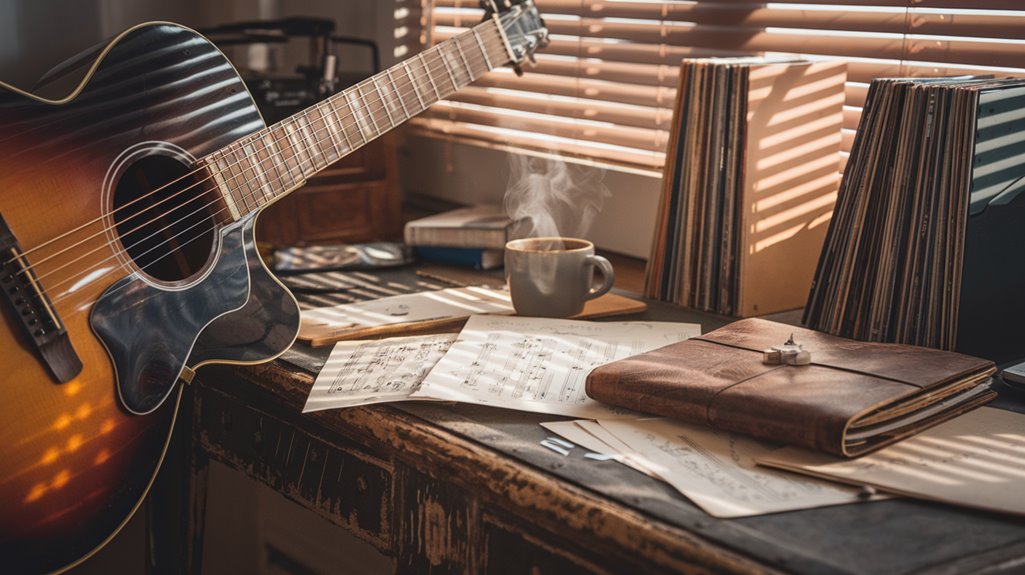
Originality stands as the cornerstone of every successful songwriter's journey. To carve your path in the music industry, you'll need to develop a signature sound that sets you apart from the crowd. Start by immersing yourself in various musical genres, picking elements that resonate with your artistic vision, and blending them to create something uniquely yours.
Study the masters of your craft, but don't simply mimic them. Analyze how successful songwriters craft their lyrics and melodies, then use these insights to inform your own creative process. Keep a songwriting journal close by to capture your raw emotions, personal experiences, and sudden bursts of inspiration. These authentic moments often lead to your most compelling and original work.
Don't be afraid to break traditional songwriting rules. Challenge yourself to explore unconventional song structures and experimental formats. Maybe your bridge comes before your first chorus, or perhaps you'll craft a hit without a typical verse-chorus pattern. These creative risks can help you discover your unique voice and signature style.
Collaboration is essential for growth. Work with other musicians and songwriters who challenge your perspective and push you beyond your comfort zone. Each collaboration can teach you something new about your artistic identity and help refine your distinctive sound. Remember, your unique style isn't something you find overnight – it's something you develop through consistent experimentation, honest self-expression, and a willingness to evolve with each song you write.
Frequently Asked Questions
How Long Does It Typically Take to Become a Successful Songwriter?
You'll likely need 3-10 years of dedicated practice to become a successful songwriter, though everyone's journey differs. You won't just write hits overnight – it's about honing your craft, building networks, and staying persistent through rejections. Digital platforms might speed things up, giving you wider exposure faster. If you're committed to workshops and industry events, you'll strengthen your chances of breaking through sooner.
What Percentage of Songwriters Actually Make a Living From Songwriting?
You're looking at a sobering reality: only 10% of songwriters make their living purely from writing songs. While you might dream of joining the elite 2-3% who achieve major success, most working songwriters need multiple income streams to survive. Even successful writers often combine songwriting with performing, teaching, or producing. The digital age has made it tougher, with streaming revenues forcing writers to diversify their income sources.
Should Songwriters Focus on Writing for Themselves or Other Artists?
You'll find success by pursuing both paths – writing for yourself and others. When you write for yourself, you're creating authentic, emotionally raw material that showcases your unique voice. But writing for other artists opens doors to valuable connections and steady income. Start with personal projects to develop your style, then branch out to writing for others. Your experience writing authentically will make you more valuable to established artists.
At What Age Is It Too Late to Start a Songwriting Career?
You're never too late to start a songwriting career. Whether you're 18 or 80, your unique life experiences and perspective can fuel compelling lyrics that resonate with listeners. Look at Leonard Cohen, who released his first album at 33, or Bill Withers, who wrote "Lean on Me" in his 30s. Your age isn't a barrier – it's an asset that brings depth, wisdom, and authenticity to your songwriting journey.
Do Successful Songwriters Need to Live in Major Music Cities?
You don't need to live in a major music city to become a successful songwriter anymore. While Nashville, LA, and New York offer valuable networking opportunities, today's digital age has changed the game. You can collaborate globally, share your music online, and build a following from anywhere. Some songwriters even find that smaller towns fuel their creativity and help them develop a unique voice without industry pressure.
Conclusion
You've got everything you need to make your mark in the songwriting world. Keep honing your craft, building those essential industry connections, and staying true to your unique voice. Remember, every hit song started with a simple idea and a passionate creator. Your dedication to learning, collaborating, and protecting your work will light the path to songwriting success. Now go write that breakthrough hit!
